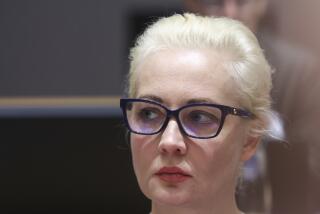Soviet First Lady Raisa Gorbachev Dies of Leukemia
- Share via
MOSCOW — Raisa M. Gorbachev, the bold and beautiful wife of former Soviet President Mikhail S. Gorbachev who stepped out of the Kremlin’s shadow to become Russia’s first truly public first lady, died Monday after a battle with leukemia. She was 67.
Raisa Gorbachev had checked into a hospital in Muenster, Germany, on July 25 with a rare and acute case of the blood cancer. She underwent chemotherapy and had prepared for a bone-marrow transplant before taking a turn for the worse last week.
Her husband, who served as Soviet leader from 1985 to 1991, was at her bedside throughout her illness and at the time of her death, hospital officials said.
The Gorbachevs were openly and deeply devoted to each other. In a few days, the couple would have celebrated their 46th wedding anniversary.
“We were bound first of all by our marriage but also by our common view on life,” Mikhail Gorbachev wrote. “We shared our common cares and helped each other always and in everything.”
At her husband’s side, the outspoken Raisa Gorbachev helped preside over one of the most extraordinary periods in Russian history, when a repressive, ideologically driven empire crumbled during his six years in office into a rough but nascent democracy.
One of Most Visible Barometers of Change
Gorbachev, with coiffed auburn hair and a smile as wide as her cheekbones, was one of the most visible barometers of her country’s change. The wives of previous Soviet leaders had been largely invisible--so much so that in at least one case, the CIA didn’t know that a leader was married until his wife appeared in a black veil by his coffin.
By contrast, the well-educated Raisa--as nearly everyone called her--set out to be a visible, Western-style political spouse, accompanying her husband to ceremonies, on trips and to charity work promotions.
She tried to bring grace and style to the unprecedented job. Designer Pierre Cardin, meeting her a few months after her husband became Soviet leader, proclaimed her “elegant and beautiful.”
“It fell to her to become our country’s first ‘first lady,’ ” her husband’s think tank, the Gorbachev Foundation, said in a statement. “She fulfilled this role admirably. Throughout the world, millions of people were inspired by her charm, intelligence and warmth.”
But for the most part, Gorbachev’s efforts to modernize and glamorize the image of Soviet women attracted more criticism than respect. At home, she generally was seen as arrogant and extravagant. Abroad, she frequently was tripped up by obscure niceties and unfamiliar protocols.
On a visit to the Vatican in 1989, Gorbachev raised eyebrows when she showed up with her husband for a private audience with Pope John Paul II in a bright red suit, breaking the unofficial dress code dictating dark colors. In Washington in 1987, fashion mavens clucked that her stockings were too dark and her heels too high.
Gorbachev also failed to charm Nancy Reagan, with whom she clashed visibly during three superpower summits.
In her memoirs, Reagan said of her counterpart: “I didn’t know what I would talk about with her, but I soon discovered that I needn’t have worried. From the moment we met, she talked and talked and talked--so much that I could barely get a word in, edgewise or otherwise.
“Perhaps it was insecurity on her part, but during about a dozen encounters in three different countries, my fundamental impression of Raisa Gorbachev was that she never stopped talking. Or lecturing, to be more accurate.”
Mikhail Gorbachev called his wife his closest confidant and said he discussed everything with her, including affairs of state. Many Russians felt it was improper for a wife to wield such influence.
For the most part, Russian disapproval of Raisa Gorbachev dissipated by the time of her final illness. In contrast to the sniping a decade earlier, Russians by the thousands sent letters and telegrams of support to the Moscow offices of the Gorbachev Foundation.
“She wasn’t like other women,” the leading Izvestia daily wrote repentantly this summer. “She was delicate and graceful, with refined taste and beautiful clothes. She became a symbol who freed herself from the country’s grayness. We didn’t understand her. And perhaps we didn’t want to understand.”
President Boris N. Yeltsin and his wife, Naina, issued a joint statement praising Gorbachev as an “excellent person, a splendid woman, a beloved wife and mother.”
Simple Background in Siberia
She was born Raisa Maximovna Titorenko on Jan. 5, 1932, in the Siberian town of Rubtsovsk, the oldest of three children. Her father, an ethnic Ukrainian, worked in railway construction and moved the family frequently as the work progressed, but they remained poor. Gorbachev recalled that despite growing up in Siberia, she didn’t own a real winter coat until she was a university student in Moscow.
Her mother, an ethnic Russian, was poorly educated and pushed her daughter to achieve in school and get a career. After earning high marks on her high school exams, Gorbachev enrolled at Moscow State University to study philosophy.
Those studies, heavy on Soviet ideology, may have added to what some perceived as a didactic manner. She became a professor of Marxist-Leninism, earned a doctorate in sociology and lectured at Moscow State until her husband became Communist Party leader.
Love at First Sight for Students
She met Mikhail Sergeyevich Gorbachev at a student dance at the university. The future Soviet leader and Nobel Peace Prize winner was immediately smitten.
Mikhail Gorbachev later recalled how hard he tried to impress her, saying that “I must have looked terribly stupid.”
“Everything else in my life took second place,” he wrote. “Frankly, I even let my studies slide, although I still did OK on my exams. But more and more I paid visits to the room where Raisa lived.”
Despite his feelings of awkwardness, she later described their courtship basically as love at first sight.
“Our relationship and our feeling were from the very outset perceived by us as a natural, inseparable part of our fate,” she wrote in her memoirs. “We realized that our life would be unthinkable without each other.”
The pair married in 1953 and, after Mikhail Gorbachev graduated in 1955, the couple moved to the southern region of Stavropol, where he had grown up. He had joined the Communist Party and rapidly began to work his way up through the ranks of the Soviet nomenklatura. While in Stavropol, Raisa Gorbachev worked on her dissertation and, in 1957, gave birth to a daughter, Irina.
The family moved to Moscow in 1978, by which time Mikhail Gorbachev had risen to the top ranks of the Communist Party. He became a full member of the powerful Politburo in October 1980, and after the death of Konstantin U. Chernenko, Gorbachev was promoted to the top job in March 1985. For the next six years, through dozens of foreign trips, the Gorbachevs were one of the world’s most visible couples.
In August 1991, Raisa Gorbachev was on vacation with her husband in the Crimea when a group of hard-liners launched a coup. The Gorbachevs were cut off from the rest of the world and held prisoner in their vacation home for three days. She later said they took lengthy walks on the grounds of the house in the hope that someone would spot them and know they were still alive. The stress left her with a stutter and other nervous symptoms that took weeks to clear up. According to some reports, she suffered a minor stroke. Friends said she never recovered fully from the shock.
Her husband, discredited and increasingly marginalized by a new set of politicians led by Yeltsin, was forced from office a few months later, in December 1991. The country he had led, the Soviet Union, collapsed, creating 15 newly independent states.
Raisa Gorbachev’s final years were quiet, filled largely with family events and a few public appearances, mostly with the Gorbachev Foundation. She was reported to have opposed her husband’s spectacularly unsuccessful bid for the Russian presidency in 1996 but displayed her devotion by accompanying him throughout the campaign. In the end, he got less than 1% of the vote.
Raisa Gorbachev is survived by her husband; her daughter, Irina; son-in-law Anatoly Virgansky; and two granddaughters, Ksenia and Anastasia.
Yeltsin sent a government plane to Muenster to bring Mikhail Gorbachev and his wife’s body home to Russia today. A public viewing is planned for Wednesday, followed by a memorial service Thursday at the Russian Cultural Foundation in Moscow. Raisa Gorbachev will be buried in Moscow’s prestigious Novodevichy Cemetery.
More to Read
Sign up for Essential California
The most important California stories and recommendations in your inbox every morning.
You may occasionally receive promotional content from the Los Angeles Times.













